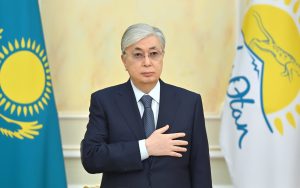On Tuesday, during a party congress Kazakhstan’s ruling Nur Otan party voted to rename itself Amanat. The change shifts the party name from “Light of the Fatherland” to “Legacy” and underscores the ongoing trend of de-Nazarbayevification that began in earnest after the January unrest.
According to Inform.kz, Tokayev supported the measure to rename the party — officially offered by Majilis Speaker Yerlan Koshanov.
Tokayev said, per Inform.kz’s translation: “The word Amanat is translated as the legacy of ancestors, mandate for future generations. Amanat is a deep notion, with special symbolism in the history and culture of the people. It reflects the unfading ideals of independence, values of strong statehood, and universal national unity. Vast expanses of our motherland left by our ancestors, we must keep and strengthen this invaluable legacy, which is our sacred duty to the past and future generations, I support the renaming of the party [Nur Otan] to Amanat.”
The word has various translations, such as “duty,” “deposit,” “mandate,” — something to be held for safekeeping, an obligation. Interfax offered “The Behest of Ancestors” as an English-language translation.
RIA Novosti noted that under Nazarbayev many organizations, programs and companies adopted names that began with “Nur” (meaning “beam” or “light” and also a notable part of the first president’s name). Most prominent in that trend was the renaming of the Kazakh capital from Astana (meaning simple “capital” in Kazakh) to Nur-Sultan under Tokayev’s presidency in the wake of Nazarbayev’s March 2019 resignation.
It’s worth dwelling on Koshanov, who introduced the measure, for a moment, too. Just as the renaming of the party reflects the ongoing de-Nazarbayevification of Kazakhstan’s political arena, Koshanov also demonstrates the separation of a once Nazarbayev-centric political stable into new factions (or rather the sifting out of some Nazarbayev-era figures — like Karim Massimov — while the rest transfer to team Tokayev). Koshanov became speaker of the Majilis, the lower house of Kazakhstan’s parliament, on February 1, replacing Nurlan Nigmatulin, who resigned and exited parliament. Nigmatulin and Koshanov have similar resumes: Both served as akim of the Karaganda region (Nigmatulin from 2006 to 2009; Koshanov from 2017 to 2019) and head of the presidential administration (Nigmatulin for Nazarbayev from 2014 to 2016; Koshanov for Tokayev from 2019 to 2022). They also both have served as head of the Nur Otan faction in parliament (Nigmatulin from 2019 to 2022 and Koshanov since February 15, 2022).
Nur Otan’s Wikipedia page has already been edited to replace the party’s former name with the new one throughout — except for the URL — though the party’s website is yet to be updated with the new name and presumably a new logo. Brushing aside the former name is also a papering over of the party’s legacy as a vehicle for Nazarbayev’s 30-year rule of Kazakhstan. Founded in 1999, over the years the party consumed the legislative branch of the Kazakh government: from 23 of 77 seats in 1999 to all 98 elected seats in 2007. Subsequent elections saw a recalibration, with Ak Zhol and the Communist Party earning seats in 2012 and onward, but offering no real opposition to Nazarbayev’s party or rule.
Tokayev officially became head of the Nur Otan party on January 28, a move set in motion by Nazarbayev back in early December 2021. Of the party’s March 1 rebranding, Tokayev said it was more than changing the name. He said it was “necessary to restructure all party work,” echoing what he said when he assumed the party leadership.
Last week, on February 25, Dariga Nazarbayeva said she would relinquished her seat in the Majilis to “focus on social, humanitarian, cultural, and charitable activities.” Her exit follows a steady stream of resignations of figures in the extended Nazarbayev family, including her rumored husband Kairat Sharipbayev from his chairmanship of QazaqGaz, the national gas pipeline operator, in mid-January. Other resignations at the time included the husbands of Aliya and Dinara, the two other Nazarbayev daughters, from their positions as chairman of KazTransOil, Kazakhstan’s national oil transporter (Dimash Dosanov) and head of the Atameken business lobby (Timur Kulibayev). Kulibayev is also reportedly losing his place, held since 2011, on Gazprom’s board. (RFE/RL reported in early February that former German Chancellor Gerhard Schroeder was on the shortlist to replace Kulibayev, but that was before the Russian invasion of Ukraine; the shareholders don’t meet til June to decide on the board composition.)
Renaming Nur Otan to Amanat is part of a rebranding exercise, but it’s yet to be seen whether Tokayev’s promised structural changes follow the name change.

































